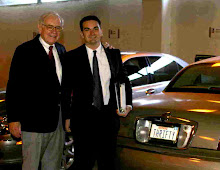The new Chairman's letter and FORTUNE
First of all, if the owners of equities are to earn much on their holdings in the future, business will have to expand at least at an equivalent rate. This is a simple but often overlooked principle. Businesses will become more valuable if they are more productive. This productivity provides earnings - capital - for investors to put into other investments. But investors cannot put all of this capital into new investments because of frictional costs. Although the most basic frictional cost is the broker commission that you pay every time you purchase a stock, we should consider any expense made in an effort to outsmart other investors a frictional cost. It is these costs that contribute nothing to the profitability of our business, but that eat away at what we take home. Notice too, that if businesses in aggregate do not expand, the stock market cannot either because there will be no new capital to reinvest in the market.
As Mr. Buffett indirectly points out, every vehicle out there to “aid” in the ownership of businesses - whether it be a mutual fund, costly investment advice, consultants or private equity funds – only prevents all of the business productivity from ending up in the pockets of the owners. In recent times, the level of frictional costs has increased horrifically. For this reason we should expect the owners of equities to see their wealth grow at a rate much lower relative to the level of business productivity growth than they have in the past.
Alarmingly, Mr. Buffett contends that frictional costs now may amount to as much as 20% of all business productivity. So investors today are earning only 80% of what they could if they worked for themselves, rather than hiring "helpers" to work for them. That remaining fifth of the pie is going straight to the helpers.
You may be surprised to read that the rate of return on the market over the last 100 years is only 5.3%, plus dividends. So should investors expect to earn even less than this much in the next 100 years? Not necessarily. It is reasonable to assume that we live in a much more productive economy than we did on average in the 20th century and thus we can expect business to grow at a higher rate than it did last century. But for shareholders to see their holdings fully reflect this growth, frictional costs will have to be reduced.
The individual, however, can see his wealth grow at or above the rate of growth of business generally. He can do this by simply avoiding frictional costs and investing in above-average businesses as Mr. Buffett has done so well over the years. This means selling only in extraordinary situations and making transactions through the lowest cost broker available. It also means avoiding the expensive consulting and investment advice promoted by brokerages. (Ironically, these services can actually be shown to hurt investors, but that is a topic for another day.)


1 Comments:
The Markman piece is not to be taken seriously - anyone who makes reference to Mr. Buffett's "juvenile humor," "self-promotion" and "homilies" obviously hasn't been paying attention. These are, I feel, what has made Berkshire great, although the characterization of his humor as "juvenile" is clearly just indicative of Markman’s general hostility towards Mr. Buffett. Wall Street folks are usually spiteful of Mr. Buffett’s success, presumably out of envy. (and maybe lack of respect of mid-Americans?)
Nonetheless, there are valid points made in the piece. Berkshire has dealt with some serious governance issues, not the least of which are AIG and now H&R Block. And if there are any truths in what Markman says, they would certainly be in his discussion of Berkshire’s due diligence practices.
Mr. Buffett has frequently bragged about how he makes decisions after meeting with management only a short time and prides himself in being able to sniff out crooks. In the past, with say, Nebraska Furniture Mart, that worked. But things are different now. Companies are bigger and they are coming to him, know what he is looking for and what kind of show to put on. So I think it is somewhat naïve of him to continue to make decisions based on a fax and faith.
If I were to start my own Berkshire Hathaway today, this is the first of Mr. Buffett’s practices that I would abandon.
But the main point of Markman’s piece is that Berkshire won’t do as well as in the past. This is undeniably true, but he never explains the cause. Berkshire is huge now, and any company with a market cap of well over $100 billion will have a hard time impressing anyone very much. I am quite sure the company will do better than other companies of comparable market cap since the businesses are superior to those of, say, General Electric, but compared to the market in general I doubt any letters will be written home about it.
By Andy Kern, at 19 March, 2006 07:58
Andy Kern, at 19 March, 2006 07:58
Post a Comment
<< Home